I am THRILLED that Dance of the Banished is one of three Canadian books selected for this prestigious list of 200 international books.
#WRlist2015
Here’s more:

A Selection of International Children’s and Youth Literature
English / Canada
Dance of the banished
Skrypuch, Marsha Forchuk (text)
Toronto, Ontario: Pajama Press, 2014. –
231 p.
ISBN 978-1-927485-65-1
World War I – Canada – Internment camp – Alevi Kurds – Armenian Genocide – Refugee – Fictitious diary

Renowned Ukrainian-Canadian author Marsha Forchuk Skrypuch has written a number of books about Canadian internment camps. Her latest YA novel again returns to this little-known topic. Set in Anatolia and Canada from 1913 to 1917, the story follows a teenage couple who are forced to go their separate ways until they are finally reunited years later. At the beginning of World War I, Ali seizes the opportunity to seek work in Canada, but is soon thrown into an internment camp for Enemy Aliens. Zeynep is left behind in their Anatolian home village, where Christian Armenians and Alevi Kurds – both minority groups within the Ottoman Empire – live peacefully side by side. When the country is shaken by revolution and war, the young Alevi girl is determined to do her utmost to save her friends from the Armenian Genocide. Told in diary form and letters from two points of view, this story recounts the horrors of World War I, but also documents people’s great compassion and courage in dangerous times. (Age: 14+)















